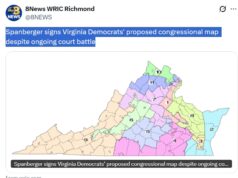Passing the buck is a political tradition. Why take responsibility for a controversial decision if you can blame someone else for making it? But there’s a risk in this strategy. Sooner or later people catch on. And if you keep telling them things that simply aren’t true, they’re going to get mad.
That’s increasingly where we find ourselves in the ongoing fight over the pipelines. For months now, we have heard that the fate of the Atlantic Coast and Mountain Valley Pipelines was in the hands of the arcane Federal Energy Regulatory Commission. It’s been a standard response to citizen concerns from up and down the ranks of government: The pipelines are a federal issue.
We heard it from Gov. Terry McAuliffe. We heard it repeatedly from Lt. Governor Ralph Northam during his primary campaign against pipeline opponent Tom Perriello. During one of the debates, Northam refused to say whether he was for or against the pipelines, falling back on the notion that his hands are tied: “At the end of the day, FERC, a federal agency will be the one to make the final determination,” he said. “It’s not something that a Governor or a Lt. Governor can make a decision on.” On July 15, Ralph Northam told a group in Charlottesville the same thing, “At the end of the day it’s an interstate project and that means that FERC is going to making the final decisions.” Just a few weeks ago, he told the Faith Alliance for Climate Solutions to focus on FERC, “If there is attention that has to be given to someone that’s gonna make the decision, it should be at the federal level.”
I’ve even heard it from some local delegates and non-elected Democratic party leaders. To a one, the message has been loud and clear: We can’t do anything about the pipelines so you might as well be quiet. After all, we have an election to win.
Yes, we do have an election to win. But this controversy isn’t going away. In fact, the issue is just starting to heat up. And if our political leaders don’t start being a bit more candid, this issue could be the story of the November elections.
Just look at what has happened in the past few weeks. From June 16-July 2, pipeline opponents staged a walk along the entire 600-mile route of the Atlantic Coast pipeline. This week, the Department of Environmental Quality’s comment period on the proposed Section 401 Water Quality Certifications for the two pipelines closed. Hundreds of people gave emotional testimony at DEQ public hearings and thousands submitted detailed written comments opposing the pipelines. On Thursday, August 24, a diverse coalition of pipeline opponents – environmental leaders, religious leaders, indigenous leaders, and community leaders – announced an historic three-day “People’s Pipeline Protest” at every office in the state from September 12-14.
Then by October 13, the DEQ will receive additional information from the developers on site-specific plans for erosion and sediment control and stormwater management. DEQ has yet to announce any plan for public review of those plans, which will be essential to evaluating the impacts of the projects on Virginia’s rivers, streams, and wetlands. Next, the State Water Control Board could meet as early as November to grant, condition, or deny Clean Water Act permits for the project. Federal permits will follow. And I haven’t even mentioned the lawsuits—every permit will be challenged in court. Or the national-level protests that could dog these pipelines to the very end, as Virginia experiences its own Standing Rock.
No. These issues are not going away, which is why the response of our elected leaders and candidates is so important. It’s time for Virginia’s elected officials to acknowledge what should never have been in doubt: Virginia has all the power it needs to stop the pipelines.
On August 18, a federal appeals court ruled that New York State was within its rights to deny permits for the Constitution Pipeline, a 121-mile $1 billion project from the Marcellus Shale in northeastern Pennsylvania through New York State. In April 2016, the NYS Department of Environmental Conservation denied water quality certifications under Section 401 of the Clean Water Act. The 14-page letter denied the permits on the grounds that the developer had failed to provide sufficient information to “address the significant water resource impacts that could occur” from the pipeline. The pipeline developer sued and the Second Circuit sided with New York, reaffirming that states have the power under Section 401 to block dangerous interstate pipeline projects on environmental grounds, irrespective of whether the federal government approved the project. The court could not have been clearer: Section 401 is “a statutory scheme whereby a single state agency effectively vetoes an energy pipeline that has secured approval from a host of other federal and state agencies.”
Detailed comments filed this week by the Southern Environmental Law Center should put to rest any notion that DEQ lacks the power to act to protect Virginia’s waters. But DEQ is shirking that responsibility with a wink and a nod from Governor McAuliffe and other elected leaders. This must change.
SELC’s comments rightly take DEQ to task for initially suggesting that the agency would conduct site-specific reviews of water quality impacts along the pipeline routes, and then backpedaling. Now, DEQ says it will rely on a blanket review conducted by the U.S. Army Corps of Engineers, even thought DEQ’s own comments on the federal Environmental Impact Statement acknowledged the limitations of the Corps’ nationwide permitting program.
Even more concerning, DEQ initiated a public comment period, scheduled hearings, and is preparing to recommend project certification to the State Water Control Board without making stormwater and erosion and sediment control plans available for public comment or considering them as part of the Section 401 certification process. This is inexplicable. DEQ has stated that these plans are “critically important” to ensuring that Virginia’s rivers, streams, and wetlands are protected. How then can DEQ proceed to certification without allowing the public to comment and without having first analyzed whether these plans are adequate to protect Virginia’s waters?
DEQ’s decision to bifurcate the regulatory process in this manner is plainly arbitrary and capricious. DEQ cannot reasonably claim to have “reasonable assurances” that the pipeline projects will not impact Virginia’s waters (that’s the standard for Section 401 certification) when it has not reviewed and apparently will not even consider “critically important” information related to erosion and sediment control and stormwater management. These plans are essential to any rational evaluation of the projects’ impacts on water quality.
Now, to be sure, energy policy is complicated and we cannot always expect our elected leaders and candidates to be experts. But there are many of us who are actually experts and are happy to set the record straight. As Ivy Main, editor of the blog Power for the People, put it, “People who understand Dominion’s pipeline hate Dominion’s pipeline.” And with good reason. (By the way, if you haven’t read Ivy’s Candidate’s Guide to Clean Energy and the Pipelines, you should. It’s an essential primer on just where we stand with renewable energy in Virginia).
The pipelines will cut a 150-foot wide swath across mountains, rivers, streams, farms, and forests—even carving up the Appalachian Trail. Drinking water for millions of residents could be impacted if there are leaks or spills. And the climate implications are staggering. A study by Oil Change International found that the combined greenhouse gas impact of these pipelines would be as much as 45 coal-fired power plants, or 158 million metric tons a year. All told, experts say the two pipelines would more than double the carbon footprint of Virginia’s power sector.
Not only are these pipelines bad news for the climate, but they will end up costing ratepayers billions. Expert analysis filed with the Virginia State Corporation Commission in August reveals that Dominion customers will end up paying anywhere between $1.6 to 2.3 billion in unneeded costs if Dominion Energy builds the Atlantic Coast Pipeline. The pipelines could raise—not lower—energy prices.
And the pipelines will further enable Dominion Energy to invest in gas-fired power plants at the expense of sustainable renewable projects. Virginia already lags behind its neighbor states significantly in wind and solar capacity. It’s not that we lack wind or sun. We simply lack the political will to invest fully in renewable resources.
I’m not the only one convinced that if a proper analysis environmental and economic analysis were done, these pipelines would not go forward. But whether you are for or against the pipelines, it’s essential that DEQ conducts a full, fair, and transparent analysis of the tremendous environmental damage these projects could cause.
In a letter to Virginia Governor Terry McAuliffe and DEQ Director David Paylor, a bipartisan group of state lawmakers, including Senators Creigh Deeds and Emmett Hanger Jr., urged DEQ to slow down its review of the pipelines and perform its own detailed analysis of the pipeline’s stream, river, and wetland crossings, rather than the agency’s proposed plan to rely on a review and blanket permit from the U.S. Army Corps of Engineers. (That was a position Ralph Northam himself took in the primary). “We write to urge the commonwealth to use the full scope of its authority to assess the impacts of the Mountain Valley and Atlantic Coast pipelines with particular emphasis on all aspects of the impacts of these pipelines on our state’s water supplies,” they wrote. The lawmakers also asked DEQ to extend the comment period so all the information on how to mitigate impacts to water resources could be publicly evaluated. DEQ denied the request to extend public comment.
“Why the rush?” the lawmakers asked. “Protection of Virginia’s streams, rivers, and public and private water supplies is too important to place at risk. DEQ must take the time to ensure it has all necessary information, review that information, give the public an opportunity for thorough review, and then conduct a comprehensive and transparent analysis of critical water crossings and all related upland activities.”
Why indeed? Is it really too much to ask that DEQ delay issuing a 401 certification until it has had the chance to evaluate all the necessary information and assure the public that these projects will not impact our drinking water, rivers, wetlands, and streams? But DEQ is charging full steam ahead—and getting little or no pushback from the McAuliffe administration.
Some months ago I asked a friend of mine, who happens to be an elected official, how he thought we could stop the pipelines. He said the only thing that could work would be a union of property rights interests and environmental activists. If we could unite enough climate activists with rural landowners concerned about eminent domain abuse, there might be enough pressure to change the politics. Well, that coalition now exists—and then some. Religious leaders are involved. Environmental justice issues are involved. Even some Republicans are involved. The movement is ready and it is growing louder by the day. And it will only get bigger as the November election approaches.
The only thing we are missing is political leadership. Too many Virginia leaders are still hiding behind FERC and washing their hands of the matter. It is time they admitted the truth: This is not just a federal issue. Virginia has the power to veto these pipelines. The buck stops with them.













![Saturday News: “Ukraine is the biggest and most consequential of all the American betrayals”; “Get Ready for Zombie Tariffs”; Murdoch’s WSJ – “Trump Demeans Himself as He Attacks the Supreme Court”; “Virginia House Delays Action on Bill Banning [Lethal Pesticide] Paraquat”](https://bluevirginia.us/wp-content/uploads/2026/02/montage0221-100x75.jpg)